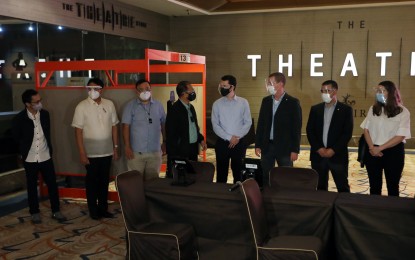
INSPECTION. Israeli health experts inspect the vaccination hub set up at the Solaire Theatre in Parañaque City on Wednesday (June 23, 2021). National Task Force Against Covid-19 chief implementer Secretary Carlito Galvez Jr. (4th from left), Presidential Spokesperson Harry Roque (3rd from left), and deputy chief implementer Vivencio Dizon (left) met with the group during the activity. (PNA photo by Joey O. Razon)
MANILA – Visiting Israeli health experts shared best practices in managing their country’s cold chain and logistics systems during a meeting held here with Covid-19 task force officials, members of the medical community and private sector representatives on Tuesday.
Considering the archipelagic composition of the Philippines, the health experts advised their Filipino counterparts to create centralized vaccine storage hubs that will cater to both urbanized and far-flung areas in the country.
“The Philippines needs more hubs since it is an archipelago. You should go for creating centralized hubs for Pfizer vaccines based on the ability to reach a certain population, and possibly with a customized approach in more remote areas,” said Adam Segal, logistics and operations manager of Salomon Levid & Elstein Ltd.
“Centralized hubs for vaccine storage will work with metropolitan areas, with a dedicated approach in remote areas,” Segal added.
He said the Israeli Ministry of Health has also developed a smaller packaging for their vaccines.
He explained that the vaccines are more secure and less prone to shaking with the smaller packaging they use.
Health Undersecretary Myrna Cabotaje requested the Israeli team to provide samples of their vials so that it will be easier for the Philippines to reproduce them.
Efficient data management
The effective management of Covid-19 data was also among the main topics covered during the learning session held between Covid-19 task force members and Israeli health experts.
Officials from the Department of Information and Communications Technology (DICT) led the discussions on the current strategy of the Philippines in managing its vaccine deployment data.
The three-member Israeli delegation explained how they developed and managed their vaccination data system.
According to Dafna Segol, the Israeli government uses a data-based approach when making decisions related to its vaccination program.
One key feature of the Israeli vaccine information system is its use of a “traffic light” model.
Through this approach, Israeli authorities are able to identify cities or areas that warrant immediate action.
“It allows us to focus on cities that need more attention,” Segol added.
Data warehouse
DICT’s Christian Edmond Chua said the agency established a data warehouse to capture information related to the vaccine supply chain and then process them to make crucial day-to-day decisions.
Chua noted that the local government units’ lack of resources remains the biggest challenge for data management in the vaccination program.
To address this situation, he said the DICT has designated LGUs as the “data owner” of their vaccination records.
This means the LGUs are accountable for submitting accurate information based on their vaccination records.
“In terms of the development of the technologies and tools to help in the submission (of vaccine data), we are adopting a low tech and low internet process,” Chua said.
The National Task Force Against Covid-19 has also developed an application that will ensure transparency and accountability in submitting data to the National Vaccination Operations Center.
“We monitor not only the performance of the LGUs but it is also helpful in providing feedback for the public policy health experts in calibrating our vaccination program,” Chua said.
The Covid-19 task force officials thanked the delegation for sharing their insights on how the Philippine government can further enhance its data management system.
“We look forward to applying the same lessons we have learned into our own practices in the Philippines,” DICT Director Amelia Dean said.
Lessons learned
Meanwhile, Health Undersecretary Ma. Carolina Vidal-Taiño noted that the meeting with the Israeli health experts would help the government further improve the implementation of its vaccine rollout.
“As we prepare for the arrival of the 40-million vaccines from Pfizer, the sharing of best practices and strategies from our Israeli partners will be a learning opportunity that we can adopt in our practice,” Vidal-Taiño said.
“We will consider the four success factors of Israel on vaccine distribution. First, the availability of trained human resources and the availability of infrastructure. Second, the small batch packaging, which we are very interested in. Third, the high usage rate and minimal waste. And lastly, the adequate preparation for the storage capacity and the outstanding cold chain distribution,” she said.5
“We have to strictly follow the safe handling of the vaccines,” said NTF Against Covid-19 chief implementer and vaccine czar Sec. Carlito Galvez during the discussions.
Galvez said the insights provided by the Israeli delegation will help the national government finetune its vaccine deployment and administration strategies and make them more responsive to realities on the ground.
“Our productive collaboration with our Israeli partners is just the beginning of our engagement with them. We are looking forward to creating more opportunities to learn from each other,” he said. (PR)
